Reflective Practice on PR Ethics & CSR - MAR015-3 Module
VerifiedAdded on 2023/06/09
|5
|861
|277
Report
AI Summary
This report provides a reflective analysis of Public Relations (PR) ethics and Corporate Social Responsibility (CSR) using the Gibbs Reflective Cycle. It details a student's experience in a project focusing on public relations and sustainability, exploring feelings, evaluation, analysis, conclusion, and action planning. The reflection emphasizes the importance of time management skills and continuous professional development. The report concludes by highlighting the value of reflective writing in enhancing understanding and knowledge, with the Gibbs model offering a structured approach to learning from past experiences. Desklib offers similar solved assignments and past papers for students.
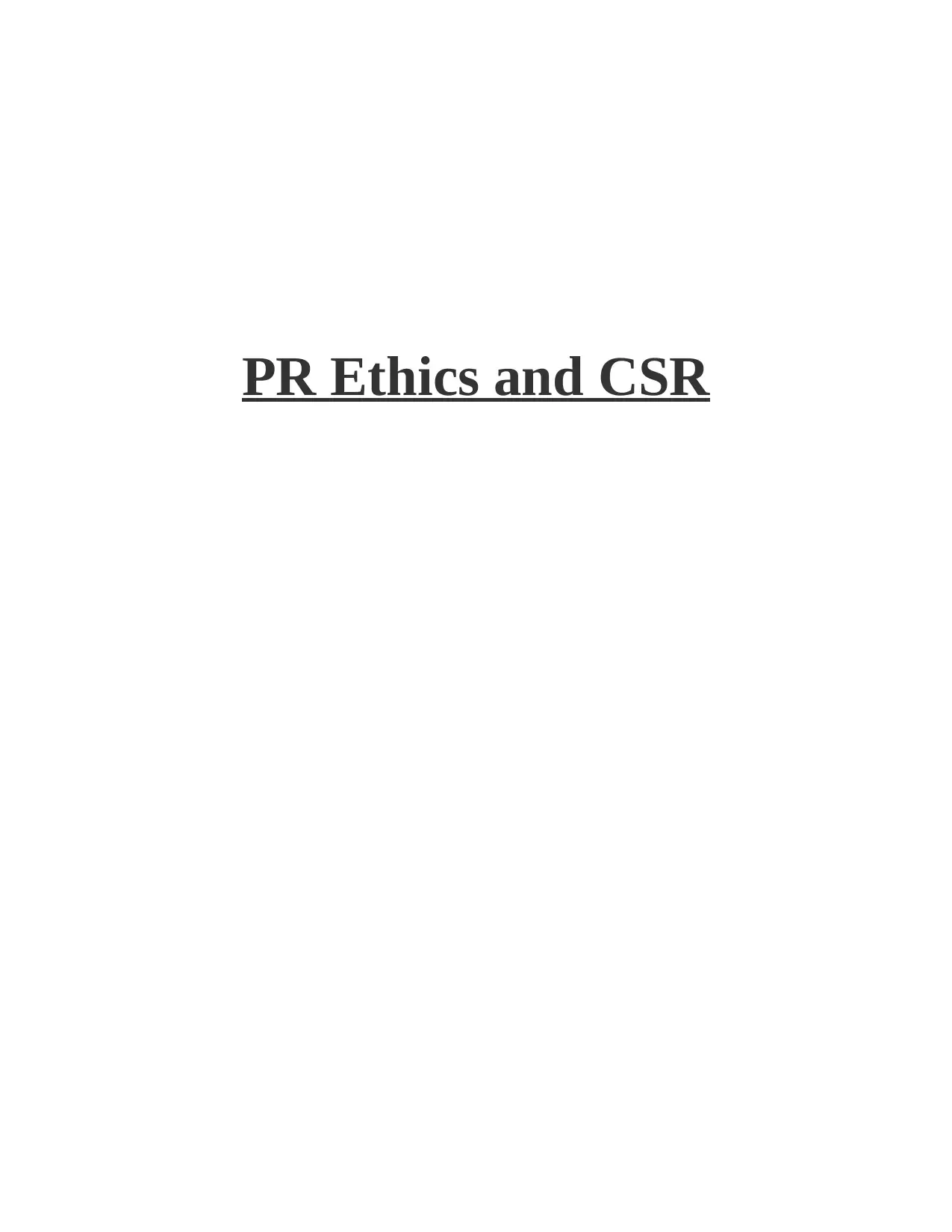
PR Ethics and CSR
Paraphrase This Document
Need a fresh take? Get an instant paraphrase of this document with our AI Paraphraser
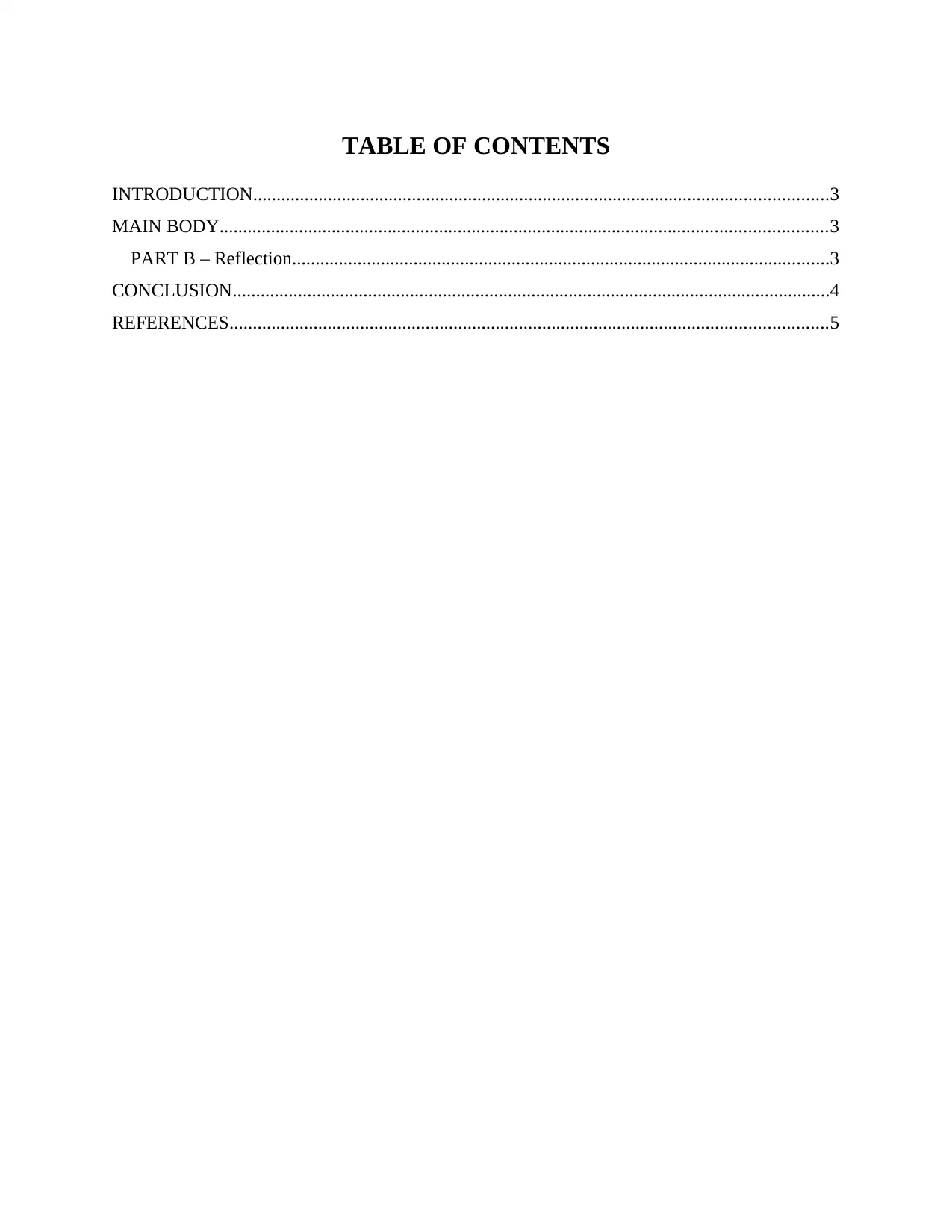
TABLE OF CONTENTS
INTRODUCTION...........................................................................................................................3
MAIN BODY..................................................................................................................................3
PART B – Reflection...................................................................................................................3
CONCLUSION................................................................................................................................4
REFERENCES................................................................................................................................5
INTRODUCTION...........................................................................................................................3
MAIN BODY..................................................................................................................................3
PART B – Reflection...................................................................................................................3
CONCLUSION................................................................................................................................4
REFERENCES................................................................................................................................5
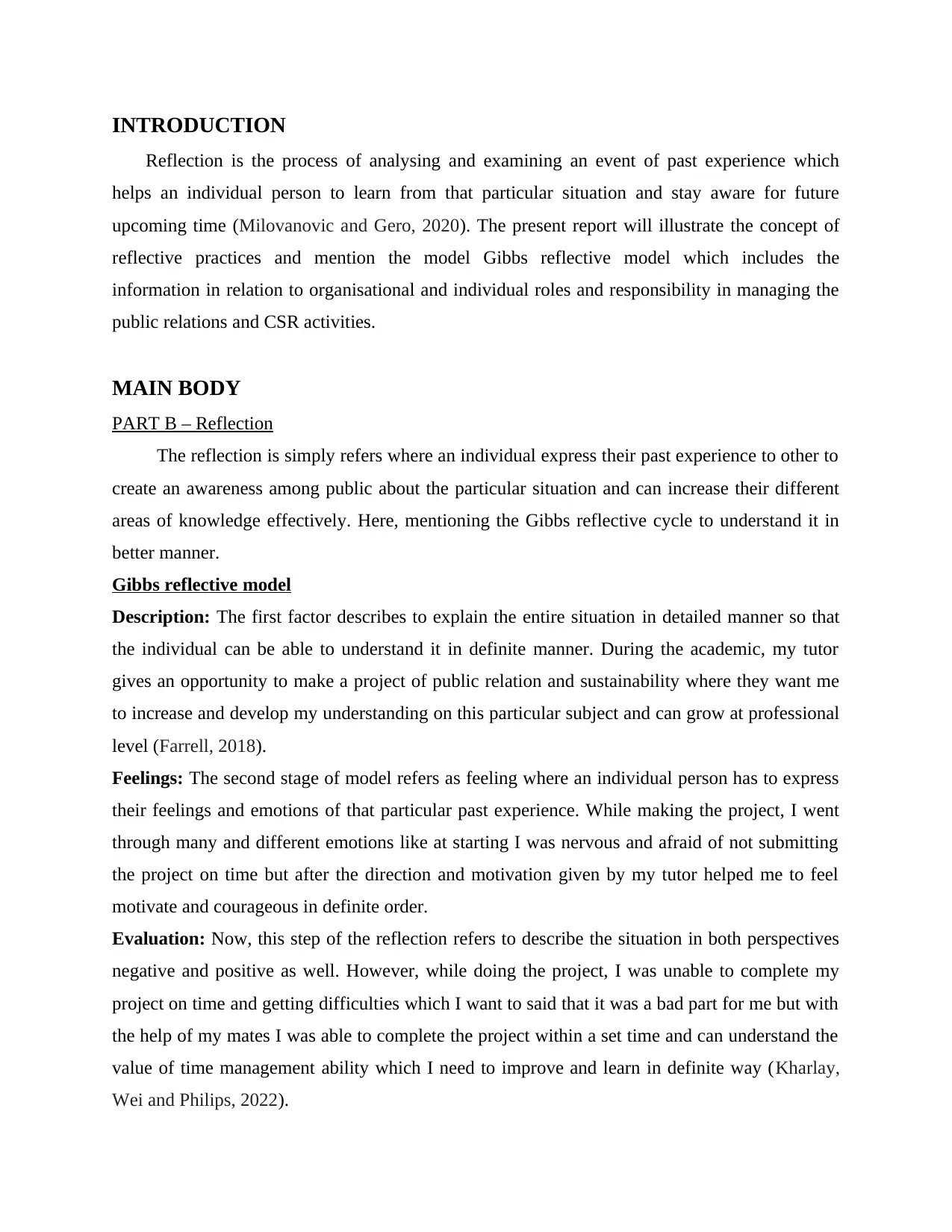
INTRODUCTION
Reflection is the process of analysing and examining an event of past experience which
helps an individual person to learn from that particular situation and stay aware for future
upcoming time (Milovanovic and Gero, 2020). The present report will illustrate the concept of
reflective practices and mention the model Gibbs reflective model which includes the
information in relation to organisational and individual roles and responsibility in managing the
public relations and CSR activities.
MAIN BODY
PART B – Reflection
The reflection is simply refers where an individual express their past experience to other to
create an awareness among public about the particular situation and can increase their different
areas of knowledge effectively. Here, mentioning the Gibbs reflective cycle to understand it in
better manner.
Gibbs reflective model
Description: The first factor describes to explain the entire situation in detailed manner so that
the individual can be able to understand it in definite manner. During the academic, my tutor
gives an opportunity to make a project of public relation and sustainability where they want me
to increase and develop my understanding on this particular subject and can grow at professional
level (Farrell, 2018).
Feelings: The second stage of model refers as feeling where an individual person has to express
their feelings and emotions of that particular past experience. While making the project, I went
through many and different emotions like at starting I was nervous and afraid of not submitting
the project on time but after the direction and motivation given by my tutor helped me to feel
motivate and courageous in definite order.
Evaluation: Now, this step of the reflection refers to describe the situation in both perspectives
negative and positive as well. However, while doing the project, I was unable to complete my
project on time and getting difficulties which I want to said that it was a bad part for me but with
the help of my mates I was able to complete the project within a set time and can understand the
value of time management ability which I need to improve and learn in definite way (Kharlay,
Wei and Philips, 2022).
Reflection is the process of analysing and examining an event of past experience which
helps an individual person to learn from that particular situation and stay aware for future
upcoming time (Milovanovic and Gero, 2020). The present report will illustrate the concept of
reflective practices and mention the model Gibbs reflective model which includes the
information in relation to organisational and individual roles and responsibility in managing the
public relations and CSR activities.
MAIN BODY
PART B – Reflection
The reflection is simply refers where an individual express their past experience to other to
create an awareness among public about the particular situation and can increase their different
areas of knowledge effectively. Here, mentioning the Gibbs reflective cycle to understand it in
better manner.
Gibbs reflective model
Description: The first factor describes to explain the entire situation in detailed manner so that
the individual can be able to understand it in definite manner. During the academic, my tutor
gives an opportunity to make a project of public relation and sustainability where they want me
to increase and develop my understanding on this particular subject and can grow at professional
level (Farrell, 2018).
Feelings: The second stage of model refers as feeling where an individual person has to express
their feelings and emotions of that particular past experience. While making the project, I went
through many and different emotions like at starting I was nervous and afraid of not submitting
the project on time but after the direction and motivation given by my tutor helped me to feel
motivate and courageous in definite order.
Evaluation: Now, this step of the reflection refers to describe the situation in both perspectives
negative and positive as well. However, while doing the project, I was unable to complete my
project on time and getting difficulties which I want to said that it was a bad part for me but with
the help of my mates I was able to complete the project within a set time and can understand the
value of time management ability which I need to improve and learn in definite way (Kharlay,
Wei and Philips, 2022).
⊘ This is a preview!⊘
Do you want full access?
Subscribe today to unlock all pages.

Trusted by 1+ million students worldwide
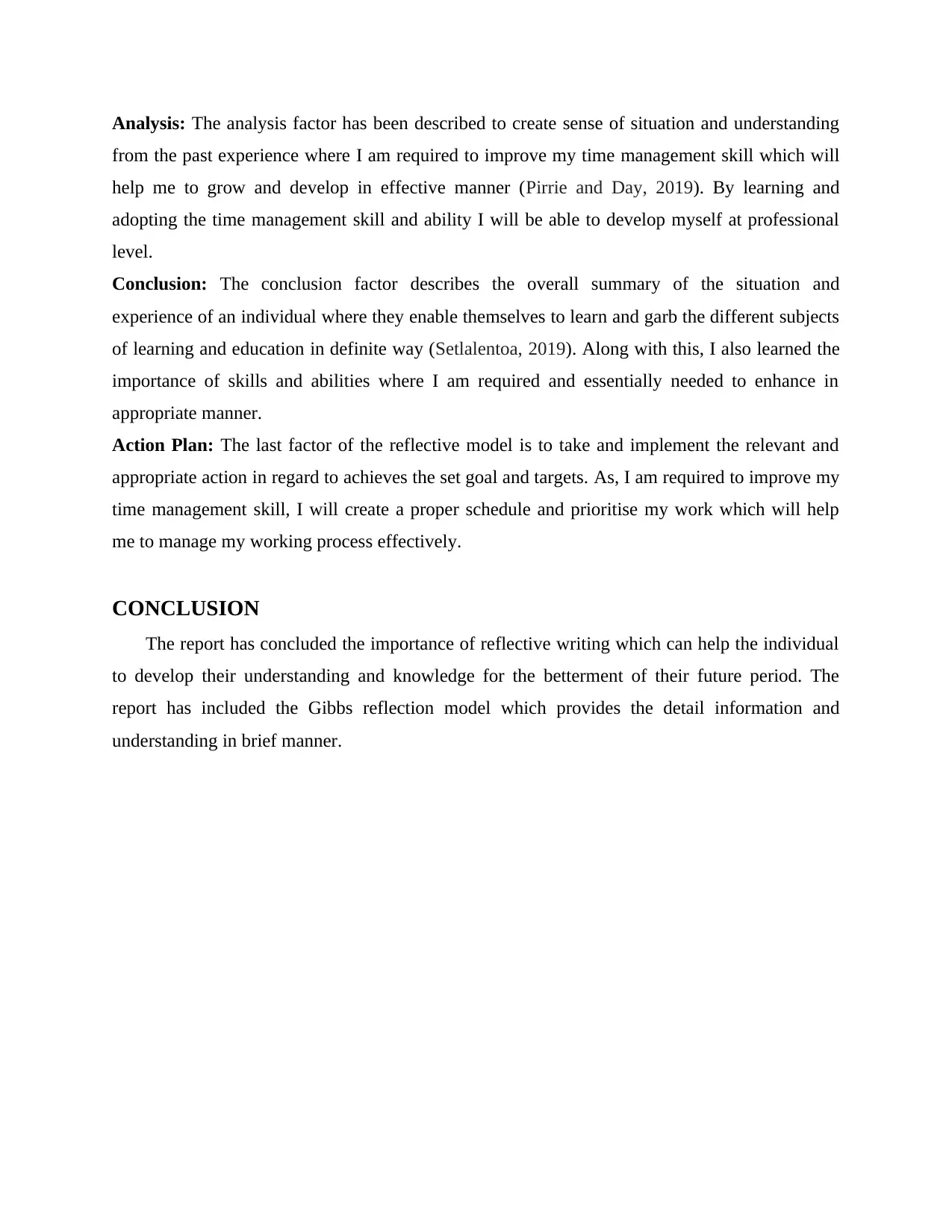
Analysis: The analysis factor has been described to create sense of situation and understanding
from the past experience where I am required to improve my time management skill which will
help me to grow and develop in effective manner (Pirrie and Day, 2019). By learning and
adopting the time management skill and ability I will be able to develop myself at professional
level.
Conclusion: The conclusion factor describes the overall summary of the situation and
experience of an individual where they enable themselves to learn and garb the different subjects
of learning and education in definite way (Setlalentoa, 2019). Along with this, I also learned the
importance of skills and abilities where I am required and essentially needed to enhance in
appropriate manner.
Action Plan: The last factor of the reflective model is to take and implement the relevant and
appropriate action in regard to achieves the set goal and targets. As, I am required to improve my
time management skill, I will create a proper schedule and prioritise my work which will help
me to manage my working process effectively.
CONCLUSION
The report has concluded the importance of reflective writing which can help the individual
to develop their understanding and knowledge for the betterment of their future period. The
report has included the Gibbs reflection model which provides the detail information and
understanding in brief manner.
from the past experience where I am required to improve my time management skill which will
help me to grow and develop in effective manner (Pirrie and Day, 2019). By learning and
adopting the time management skill and ability I will be able to develop myself at professional
level.
Conclusion: The conclusion factor describes the overall summary of the situation and
experience of an individual where they enable themselves to learn and garb the different subjects
of learning and education in definite way (Setlalentoa, 2019). Along with this, I also learned the
importance of skills and abilities where I am required and essentially needed to enhance in
appropriate manner.
Action Plan: The last factor of the reflective model is to take and implement the relevant and
appropriate action in regard to achieves the set goal and targets. As, I am required to improve my
time management skill, I will create a proper schedule and prioritise my work which will help
me to manage my working process effectively.
CONCLUSION
The report has concluded the importance of reflective writing which can help the individual
to develop their understanding and knowledge for the betterment of their future period. The
report has included the Gibbs reflection model which provides the detail information and
understanding in brief manner.
Paraphrase This Document
Need a fresh take? Get an instant paraphrase of this document with our AI Paraphraser
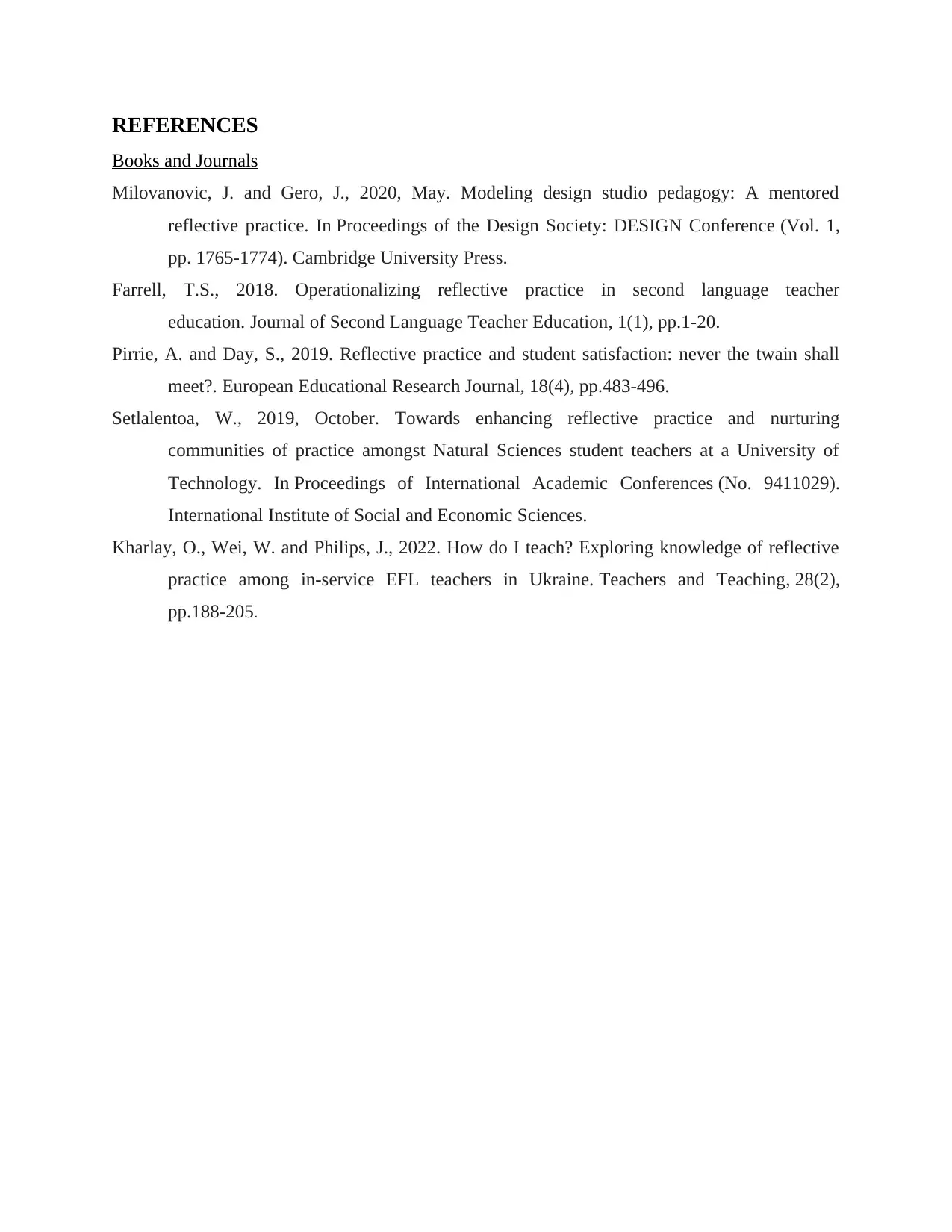
REFERENCES
Books and Journals
Milovanovic, J. and Gero, J., 2020, May. Modeling design studio pedagogy: A mentored
reflective practice. In Proceedings of the Design Society: DESIGN Conference (Vol. 1,
pp. 1765-1774). Cambridge University Press.
Farrell, T.S., 2018. Operationalizing reflective practice in second language teacher
education. Journal of Second Language Teacher Education, 1(1), pp.1-20.
Pirrie, A. and Day, S., 2019. Reflective practice and student satisfaction: never the twain shall
meet?. European Educational Research Journal, 18(4), pp.483-496.
Setlalentoa, W., 2019, October. Towards enhancing reflective practice and nurturing
communities of practice amongst Natural Sciences student teachers at a University of
Technology. In Proceedings of International Academic Conferences (No. 9411029).
International Institute of Social and Economic Sciences.
Kharlay, O., Wei, W. and Philips, J., 2022. How do I teach? Exploring knowledge of reflective
practice among in-service EFL teachers in Ukraine. Teachers and Teaching, 28(2),
pp.188-205.
Books and Journals
Milovanovic, J. and Gero, J., 2020, May. Modeling design studio pedagogy: A mentored
reflective practice. In Proceedings of the Design Society: DESIGN Conference (Vol. 1,
pp. 1765-1774). Cambridge University Press.
Farrell, T.S., 2018. Operationalizing reflective practice in second language teacher
education. Journal of Second Language Teacher Education, 1(1), pp.1-20.
Pirrie, A. and Day, S., 2019. Reflective practice and student satisfaction: never the twain shall
meet?. European Educational Research Journal, 18(4), pp.483-496.
Setlalentoa, W., 2019, October. Towards enhancing reflective practice and nurturing
communities of practice amongst Natural Sciences student teachers at a University of
Technology. In Proceedings of International Academic Conferences (No. 9411029).
International Institute of Social and Economic Sciences.
Kharlay, O., Wei, W. and Philips, J., 2022. How do I teach? Exploring knowledge of reflective
practice among in-service EFL teachers in Ukraine. Teachers and Teaching, 28(2),
pp.188-205.
1 out of 5
Related Documents
Your All-in-One AI-Powered Toolkit for Academic Success.
+13062052269
info@desklib.com
Available 24*7 on WhatsApp / Email
![[object Object]](/_next/static/media/star-bottom.7253800d.svg)
Unlock your academic potential
Copyright © 2020–2026 A2Z Services. All Rights Reserved. Developed and managed by ZUCOL.



